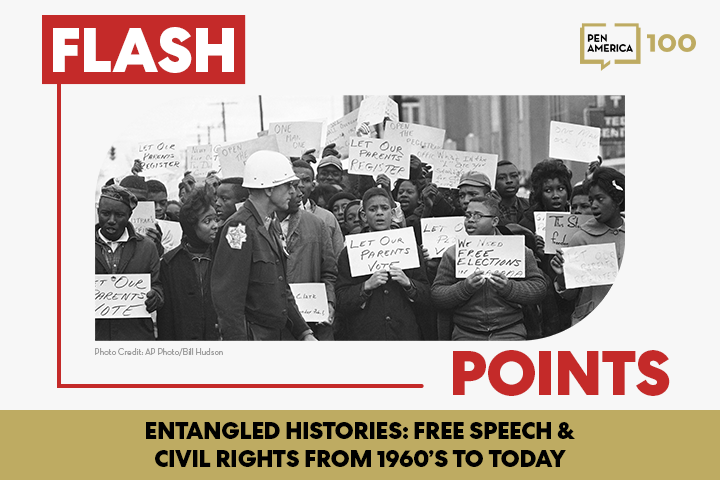Entangled Histories: Free Speech & Civil Rights from the 1960’s to Today

This discussion examines how the mid-1960s were a turning point not only for the Civil Rights movement, but also for the history of free speech in the U.S. From the Civil Rights Act to landmark Supreme Court decisions, the boundaries of the First Amendment were tested in ways that affected civil rights in the decades following.
DOWNLOAD OUR DISCUSSION GUIDE AS A PDF
Video Highlights
- 7:19 Listen to moderator DeJuana L. Thompson introduce the three panelists.
- 11:50 Listen to Carlos Ball discuss three Supreme Court cases from the Civil Rights era centering on free speech and equality.
- 19:20 Listen to Ball discuss two early Supreme Court cases concerning LGBTQ free speech.
- 26:42 Listen to Tara Y. White discuss Black women’s central role in Civil Rights era organizing and protests in Birmingham.
- 37:10 Listen to Michael Harriot discuss how the First Amendment is often weaponized against Black people by the state.
- 1:23:48 Listen to Ashley M. Jones read and sign a closing poem.
How has the First Amendment been invoked to help or to hinder the progress of civil rights? The following video focuses on a historical flashpoint that illuminates how the fight for civil rights has been bolstered by the freedom of speech.
Contributing Scholars
DeJuana Thompson is the current President and CEO of the Birmingham Civil Rights Institute. Thompson is a political and social strategist providing innovative and sustainable engagement methods and models for candidates, campaigns, and community organizations.
Carlos A. Ball is a Professor of Law at Rutgers Law School and a nationally recognized expert on LGBTQ rights law and constitutional law.
Michael Harriot is a columnist at theGrio.com and The Guardian where he covers the intersection of race, politics, and culture.
Dr. Tara Y. White is an Assistant Professor of History at the University of North Carolina Wilmington, where she specializes in African American history and public history.
With poetry readings by Alabama’s Poet Laureate and PEN Birmingham chapter co-director Ashley M. Jones
From the PEN archives
- “In Conversation: Jamal Joseph and Sonia Sanchez” on the Black Panthers and Black art (2012)
- “Writing in a Racialized Society” with Hazel Carby, Toni Morrison, & Cornel West (1992)
- “Afro-American Autobiography” with Claude Brown, Henry Louis Gates, Jr., Itabari Njeri, Arnold Rampersad, Sarah E. Wright (1990)
- Susan Sontag, Jiri Grusa, Salman Rushdie, & Derek Walcott on “Alienation & the State” (1986)
- “The Problem of National Identity” at the 48th PEN International Conference with Kofi Awoonor, John Barth, Lu Wenfu, Omar Cabezas, Robert Stone, and others (1986)
Primary Sources
- “Letter from a Birmingham Jail,” Martin Luther King, Jr.
- “NAACP v. Alabama,” 1959 Supreme Court ruling
For a Deeper Dive
- Article on NAACP v. Alabama from The First Amendment Encyclopedia
- LGBTQ activist poster exhibit
